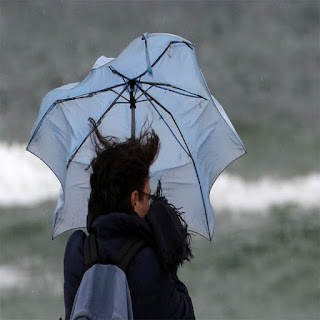Deutsch - German
Anke: Hallo Joe!
Joe: Hallo Anke! Schön, dass du da bist!
Anke: Ja, schön dich zu sehen!
Joe: Wollen wir gleich in den Dom?
Anke: Ja natürlich, warum sind wir sonst hier!
Joe: Haha, ja. Dann los zur schönen Aussicht!
Anke: Ja, auf geht‘s!
...
Joe: Uff! Mensch, diese vielen Stufen!
Anke: Ja, das ist wirklich eine sehr lange Treppe! Aber guck…..sieht Berlin nicht toll aus von oben?!
Joe: Ja, eine tolle Stadt! Aber es ist ganz schön windig hier! Gut, dass ich eine dicke Jacke anhabe.
Anke: Ja. Ich bin auch froh, dass ich eine warme Jacke anhabe. Und ich habe noch dicke Handschuhe und einen dicken Schal mit.
Joe: Oh Gott, guck mal da! Der Mann hat nur eine Hose und einen Pullover an und keine Jacke!
Anke: Oh, nein. Das ist viel zu kalt!
Joe: Ja, das finde ich auch!
Anke: Joe, die Aussicht ist ja schön hier, aber es ist wirklich kalt.
Joe: Ja, stimmt. Hmm, wir könnten ja etwas essen gehen. Wenn wir drinnen sind, wird uns sicher warm.
Anke: Ja, das hört sich gut an und ich kenne einen guten Italiener dort vorne, da gibt es leckere Spaghetti!
Joe: Na dann los!
Englisch - English
Anke: Hello Joe!
Joe: Hello Anke! It's good that you're here!
Anke: Yeah, good to see you!
Joe: Shall we go into the cathedral now?
Anke: Yes, of course, why else are we here?
Joe: Haha, yeah. Let's go see the beautiful sights!
Anke: Yeah, here we go!
...
Joe: Man, so many steps!
Anke: Yes, that's a really long staircase! But look....doesn't Berlin look great from above?
Joe: Yeah, a fantastic city! But it sure is windy here! Good thing I have a thick jacket on.
Anke: Yes. I'm happy that I have a warm jacket on, and I also brought along thick gloves and a thick scarf.
Joe: Oh God, take a look there! That man only has pants and a sweater and a small jacket!
Anke: Oh no, that's much to cold!
Joe: Yeah, that's what I think too!
Anke: Joe, the view is beautiful here, but it's really cold.
Joe: Yeah, you're right. Hmm, we could go get something to eat. If we're inside, then we'll get warm for sure.
Anke: Yeah, that sounds good, and I know a good Italian restaurant out front, where they have really yummy spaghetti!
Joe: Let's go!
Wortschatz- und Satzgebrauch - Vocabulary Phrase Usage
1. Handschuh, literally hand-shoe, is the German word for a glove.
2. mit-haben = to have brought along. Anke said "Ich habe einen dicken Schal mit" (I have brought along a thick scarf).
3. "Drinnen wird uns sicher warm" = Inside we will certainly get warm. "uns wird warm" is used for "we will get warm". Similarly, you'd say "Mir wird kalt" to mean that you're getting cold. In German, it's all about becoming rather than getting.
4. In this dialog, "Italiener" (Italian person) was used to mean an Italian restaurant, with presumably an Italian chef. This is common colloquial practice. English is the same actually if you say "I know a good Italian nearby". The context clarifies your meaning.
Grammatik - Grammar
The focus of this lesson is basic adjective endings
Eine tolle Stadt!
"A great city!"
German adjective endings are something that even advanced students of German may get wrong.
Fortunately it's also one of the least important grammar items when it comes to being understood.
Germans often slur the endings, or don't even recall the right endings because they're used to slurring them so much. However, let's go over the very basics here, and if you can memorize this, you will see a big improvement to the amount of endings you get right.
First, you should remember that in German, only adjectives that are in front of nouns get any kind of ending. If an adjective is somewhere else in the sentence, it is unchangeable. This is a major difference compared to other European languages that you may have studied. Makes things a lot easier. On the down side, German adjectives get different endings if their nouns are definite or not, so that's added an complication other languages don't have.
In this lesson, I want to talk about two endings that are used in at least 80% of the cases that you will see. The endings are -e and -en.
Think of -en as the base ending. If you have no idea what ending an adjective should get, then it's probably -en, especially if the adjective is following a definite article or if the noun is plural. By contrast, -e should be your first thought if the noun is feminine or neuter and used in the Nominative singular or Accusative singular. That is, if the noun is used as the subject or direct object. -e is also used if the noun is masculine and the adjective is following „der“.
And that's it! If you memorize these simple rules, you can safely ignore adjective endings until you're at an upper intermediate or advanced level and you've eliminated all other systematic mistakes.
Kultureller Einblick - Cultural Insight
Clothing
Convert your sizes before coming here
Some sizes, such as XXL and up, are only available in specialty stores, because few Germans need them
On average, people are more conscious about fashion and will often choose fashion over comfort. To fit in better, bring the better part of your wardrobe.
Bring at least one thing other than jeans in case you are invited to a nice restaurant, invited to see somebody's grandparents or want to attend church on Sundays. Traditionally, people are expect to dress best on Sundays, out of respect for the day


DANKE
ReplyDelete